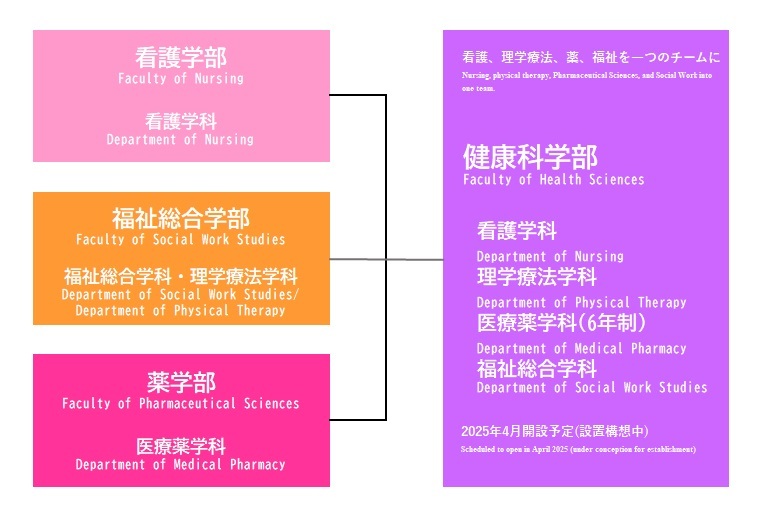JIU Josai International University

"Faculty of Health Sciences" scheduled to open in April 2025 (establishment planning underway)
news
2024.01.30
Planning to open a "Faculty of Health Sciences" that will combine nursing, physical therapy, medicine, and welfare into one team.
*Scheduled to open in April 2025 (installation planning underway). The installation plan is tentative and is subject to change.

Josai Internationaluniversity At , we view health, medical care, and welfare as one team, and provide cross-disciplinary education. Taking this one step further, we integrated Department of Nursing, Department of Physical Therapy, Department of Pharmaceutical Sciences, and Department of Social Work Studies. Plans to establish a new “Faculty of Health Sciences” (Scheduled to open in April 2025 (installation planning underway)). Here, you will not be limited to one area of expertise, but will have a wide range of perspectives from local health, medical care, and welfare to cutting-edge medical care, and will develop your problem-solving skills. Professional human resources who can collaborate in their respective area of expertise We will continue to grow. Specifically, we offer unique multidisciplinary collaborative education in which area of expertise of health, medical care, and welfare work together, a wide range of general education subjects that take advantage of the strengths of a comprehensive university, and an overseas program that incorporates the experience of international universities. We plan to actively provide training to learn about team medical care, as well as health, medical, and welfare DX education that is essential for team medical care. Please feel free to use the services provided by our university. New learning in health science Please pay attention to.
In Japan's health, medical and welfare fields, Professionals such as nurses, pharmacists, physical therapists, social workers, and care workers work together to improve the health and quality of life of patients and users. doing. Depending on the condition of the patient or user, the nurse monitors the condition and adjusts the medical schedule, and the pharmacist suggests appropriate drug therapy. At the same time, physical therapists plan rehabilitation programs for patients and users, and social workers provide support throughout the lives of patients and users. Care workers also work closely with patients and users in a wide range of areas, from support in daily life to psychological care. In addition, future health, medical care, and welfare will not only focus on patients and users with traditional diseases; It is necessary to respond to the various needs faced by all people aiming to achieve well-being, and this range covers all life stages from birth to end of life. This also requires the help of kindergarten teachers and childcare workers. In Japan, which is a super-aging society, this kind of cooperative system allows health, medical, and welfare professionals to provide comprehensive and effective medical care and services, improve health and quality of life, and improve the health of local communities. I support you.
In Japan's health, medical, and welfare universities, it is common for students to choose area of expertise upon admission, making it difficult for students to gain an understanding of other area of expertise. However, at overseas universities, it is common for students to receive basic education in their first year, and then choose their own area of expertise. This is also the case at universities in Asian countries such as Thailand, Malaysia, and recently China, and this is based on the value of team medical care formed by understanding each area of expertise. In the field of health, medical care, and welfare, it is essential to understand and cooperate with the roles of other area of expertise, not only in dealing with diseases but also in terms of well-being. For this reason, as an international university, our university will be the first in the country to adopt global standards in order to avoid becoming a Galapagos school of education.